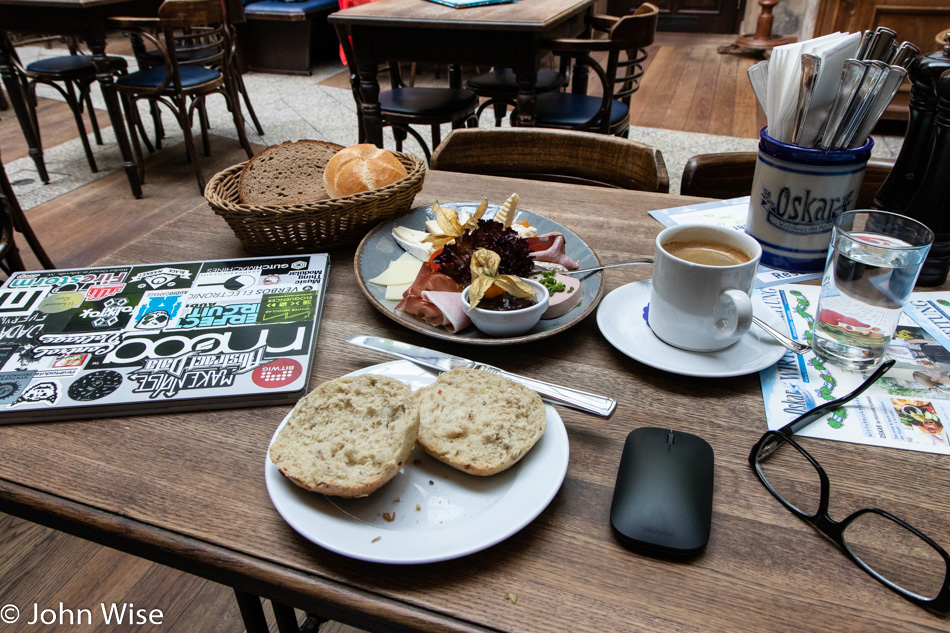
Nothing is certain about the things that don’t really matter. Things that matter in Germany are schedules, bureaucracy, and attention to detail that pertains to your work. So rules matter, but if a small business opens on time, if breakfast is available at the cafe you want to visit, or if a business closes early, none of that matters. Somehow, that’s okay because you have options. If you miss the train at the half-hour, get the next one. Is coffee not ready at the cafe? Who cares; just sit down and relax; it will arrive.
You will not find much open if you are an early riser unless you visit the train station, where businesses cater to travelers heading to other cities or work. Should you decide to start your day at 8:00 or thereabouts, you will likely find everything you want, and that’s how things have mostly worked out during this and my previous visits to Germany.
Today, I’ll head to Kulmbach. The train leaves at the top of each hour, but first, I must have breakfast and coffee. I’ll likely miss the 9:00 train; no, I will certainly miss that one. It’s a 30-minute ride out that way, and other than the note in my itinerary that suggests I might consider this side trip; I have no real idea why I put it up for consideration. No matter; I’ll get into town around 10:30, walk out of the station and start wandering around. When all is said and done, I can hope that I didn’t miss something I’d thought was important prior to my arrival in Germany. Time to eat.
With food having passed the gullet and the renewed energy about to kick in along with the enhancing boost of my old friend caffeine, I’m better prepared to face the day.
The idea of getting on the road to Kulmbach is really nothing more than John reliving his old self as a 23-year-old man freshly arrived in Germany, getting on a random train to head somewhere. I didn’t care where the train went; everything was new and foreign and was guaranteed to hold sights I’d never seen before.
When I was but a couple of years old and walking down a street in Buffalo, New York, with my hand in the warm embrace of my mother’s hand, I was an anonymous fish lost in the sea. When I was 25 years old, walking down Glauburgstrasse in Frankfurt, Germany, with my hand in the tender embrace of Caroline’s hand, I was one in a pod of two exploring the construct of a relationship that would become home. I am 56 years old now, and my heart and mind are entwined with the person who needn’t be present to be ever-present. I still find it difficult to grasp that I’m part of a larger universe, trying to understand this idea of self that is simply in the moment and embraced in the love of the simplest and most complex of existences.
Today, I’m still not far away from the 2-year-old or the 23-year-old; I’m not sure I’ve fully inhabited the place of the 56-year-old as I’m still unfolding. Today, I will add to all of those iterations of the threads known as John Wise that are a part of the tapestry of my life.
So, the road to Kulmbach is really nothing more than part of a metaphor for being aware that I’m still trying to find the important discoveries of what will shape yet another iteration of me. At the same time, I’m aware that I can contribute my presence to the experiences of others so that they, too, will share one of the trillion moments that become the glue, ensuring the tapestry doesn’t unravel before it wears out and turns to dust.
This brings me to a random bit I finally came to understand while on my walk across Germany. Why do Germans not greet one another as strangers should they accidentally make eye contact or simply be friendly when passing someone on a narrow sidewalk? Saying hello to strangers is a dangerous affair, contrary to what Americans think. You see when you say “hello” to someone, and they are obliged to return the greeting, they are potentially opening themselves to vulnerability. People sense the sincerity, mistrust, or anxiety that comes with vocalizing a greeting. To the man who randomly says “good evening” to a passing woman, her response will be interpreted according to his filter. If she’s apprehensive and the man is slightly aggressive, he might see her as vulnerable, yet her confident response will suggest she would like to be left. Weakness is nothing any of us are proud of, but to exploit this insecurity under the guise of simply being friendly is a crass manipulation and gesture that America should soon forget.
Maybe today’s blog entry should have been titled Day of Observations.
A young woman with a worn-out shoe walked with her right foot rolling as she took each step. Maybe she’s causing a chronic injury to her foot, her knee, or maybe her hip, and doesn’t know yet what her inability to purchase new shoes will do to her future. An old heavyset lady walks on well-worn shoes with swollen ankles; maybe her pension doesn’t allow her to buy a new pair? An elderly man limps past with a cane in his right hand, either to alleviate the pain or it could be he’s a fall risk. All three of these people are doing their best with what they have. So what of the person sitting on the corner begging for a handout? Is this the best they have to offer? Is this the extent of their effort?
Once on the train to Kulmbach, a woman asks if she’s on the right train to Bamberg, but I’m not certain if that’s her question, so I excuse myself, and someone on my left answers that this is indeed the train she was hoping it was. Here I was thinking that as a foreigner barely in possession of the most rudimentary German, I was alone in my uncertainty, but I guess auto-pilot might have been at work and, like me, leaving my driveway back home and turning to go towards work instead of where I was intending to go works out to about the same thing.
Something interesting is starting to occur here on my 13th day in the European Union, I’m beginning to recognize that the cities I visit are essentially very similar to one another other than the scale and amenities. I came to Germany with expectations of the environment lending itself to my writing, but the truth is that I already have all that I do at any given moment to use towards that goal. What I had for dinner last night has no role in what I might write at breakfast. The grave I stood next to doesn’t impact the way I see the woman’s old, worn shoes. The difference, if there is one, is that I’m solely focused on being here and using my time to sit down to write at every opportunity that shows itself.
What the environment does lend to me is the chance to consider specific subject matter, such as when I was in the Grand Canyon and wrote extensively about that experience or, similarly, the Alsek up in Canada and Alaska. In Weimar, I traveled with Nietzsche, Goethe, and Schiller in my head. Today, I travel with a blank slate, wondering what’s ahead.
Is this the secret sauce I’m missing if it is my wish to one day write fiction? I first need to create the characters and then take them into the world as I want to see them.
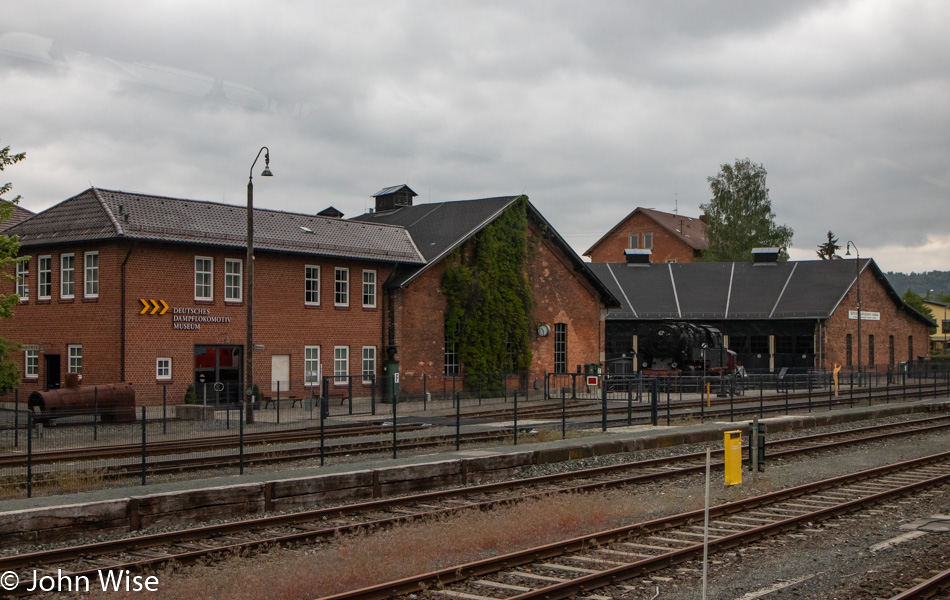
At the first stop here at Neuenmarkt-Wirsberg is the Deutsches Dampflokomotiv Museum. The location for the beginning of where my novel gets underway. Is it a period piece about when these old steam trains plied the rails or a story that emanates out of the history of a steam train that has been decommissioned and rests at the museum, or maybe it moves between the two periods? Maybe there’s a component of the conflict I find myself in culturally where, at my age, visiting a museum was something grand as I was able to gaze directly upon our past and wonder who may have owned a particular object or how the person in the portrait warranted such attention. Today, I sense that the immediacy of experience offered by the smartphone in one’s pocket can bring them to whatever object requires study instead of needing to lose valuable time actually visiting a place that isn’t meant to be experienced through an activity that alights the sense of adventure or awe as defined by the generation growing up with tools that are far different than those I grew up with.
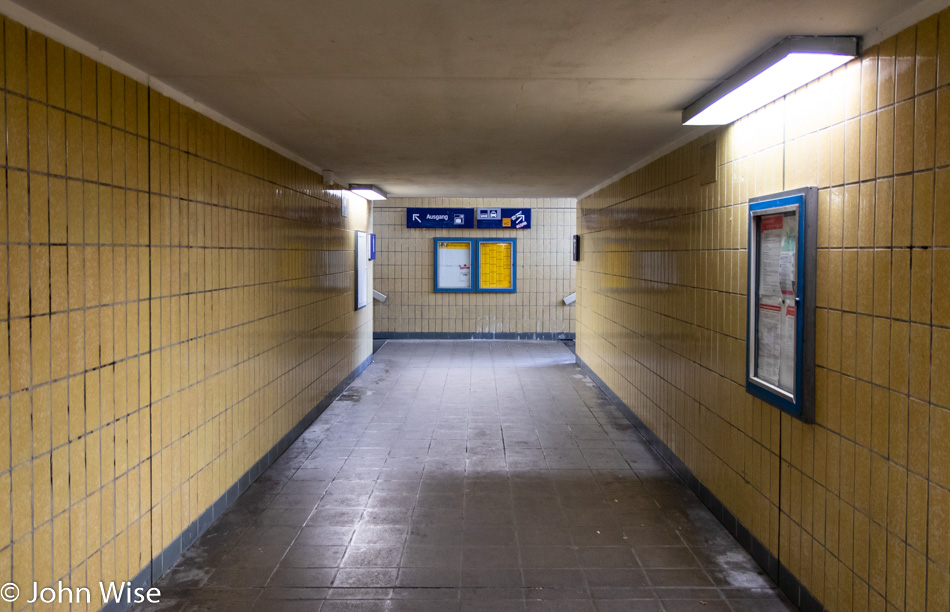
I’m willing to take the train out to some random village and though I even did this in my youth, today’s young people have priorities that I’m not either fully aware of or that I’m unable to grasp. Is this so different than a generation that saw their children want to go to a concert, smoke some weed, and watch TV late into the night? Likely not.
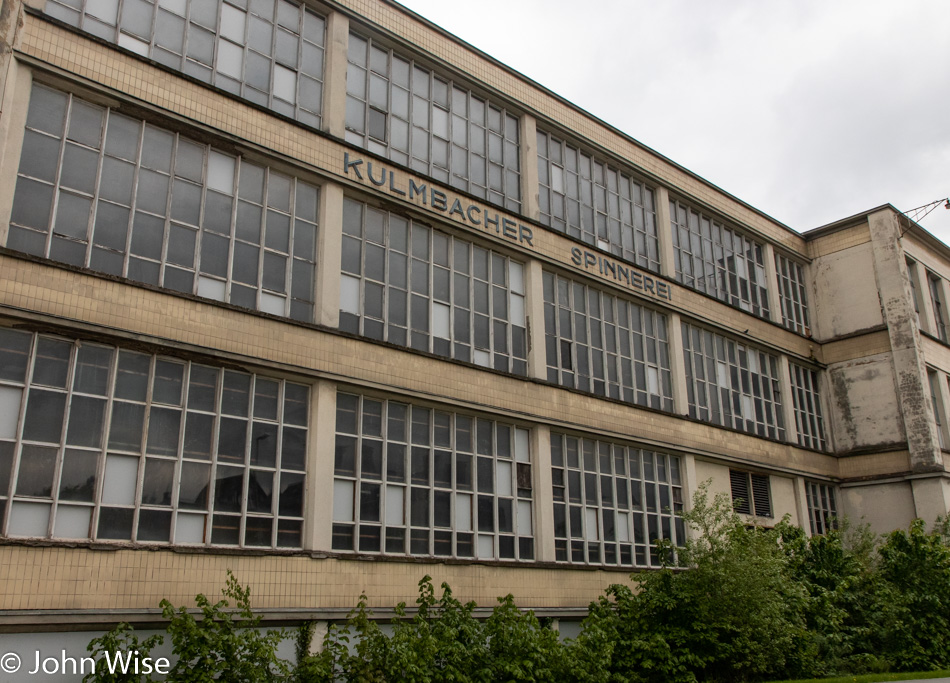
I must have been expecting something because I chose this village as a destination, but just what was it? The gray of the day doesn’t add an ambiance that would be confused with happiness. The defunct spinning factory across the street from the main station doesn’t help either. Kulmbach has seen better days. There’s a mall that’s in a similar state of depressing disuse as people decide to shop elsewhere. I can’t say it’s a generalized online thing here in Germany because the main shopping areas are vibrant with well-kept busy shops and a lot of foot traffic. A large tenant in the mall is a grocery store that is far larger than its storefront alludes to, as it stretches around behind the postered-over windows that help lend an empty feeling to this place.

Windbeutels are here and were quite a favorite of mine when Caroline and I were living in Germany. These little puffs of pastry are filled with frozen cream, and the pronunciation of them made me as happy as eating them: Vind Boydils. Bami Goreng and the Vitalis Knusper Muesli, along with fish fingers, helped round out my fond walk-through memories of shopping with Caroline on a tight budget 30 years ago.
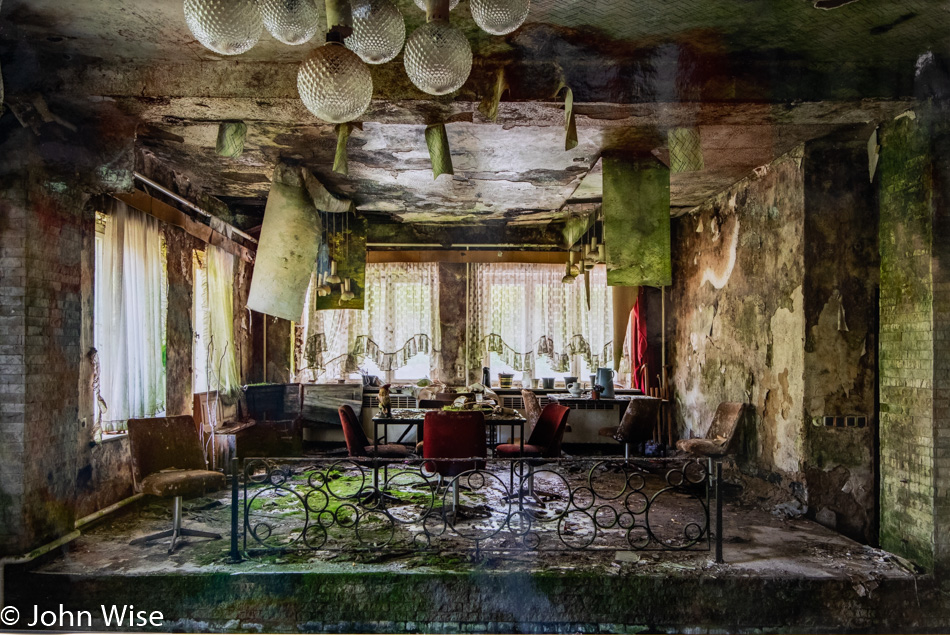
There’s an abundance of elderly people here, which may not mean a lot other than the young people are at school and the slightly older are at work in other cities. The problem with this theory is that other than Bayreuth, which is about 30 minutes away, the next biggest city is Bamberg, an hour away, and then there’s Nuremberg, but at 110km away and about 90 minutes to get there, it doesn’t seem like the best usage of time. If this is an indicator of life for the approximately 150 villages surrounding Kulmbach at a 60km diameter from here, then it’s no wonder there’s fear of losing jobs of those people in these outlying areas thinking jobs should be coming to them instead of foreigners taking jobs in the bigger cities.
*** Photo Note: I did not take the above photo or own the copyright. While I photographed the photo of an abandoned building that was on display in the mall, I just wanted to point out that this is the work of someone else.
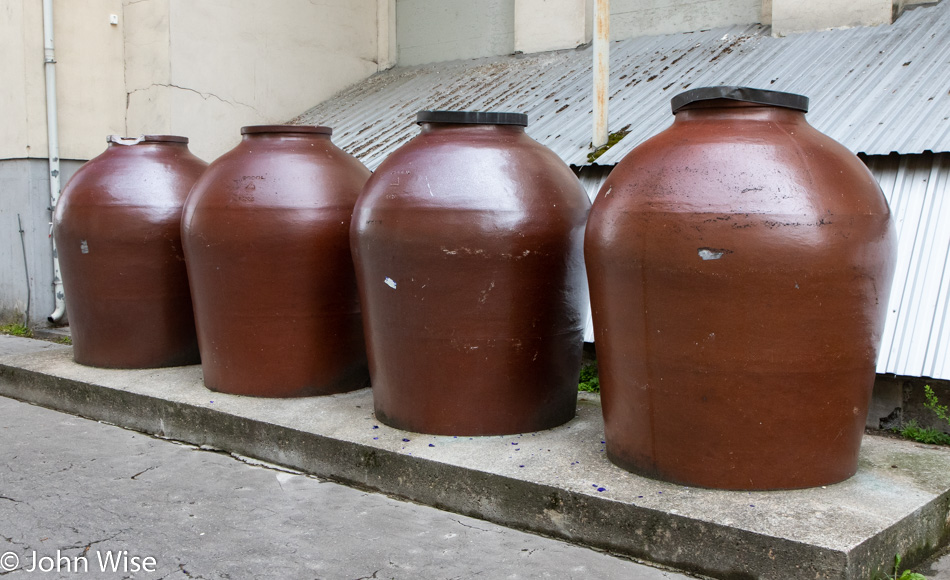
Investments in cities happened because of what they could contribute to the larger economy, such as the large factory in town that at one time spun thread and yarn for the making of clothes and also had a dyeing operation. In nearby Mainleus, the other part of the factory once employed 4,000 before bankruptcy. By 1993, the company employed 780, and by 2010 only 227 were left. Then just three years later and near the date of its 150-year anniversary, the company ceased all operations, and the buildings have fallen into dereliction since. If we look across the region, I’d wager we’ll see dozens of these stories and could meet hundreds of people who knew somebody who’d had careers that allowed great lives to be had while these factories were still humming. Somehow, I don’t see these 60 to 85-year-olds walking about town, picking up on any social media skills, or starting a streaming media channel on YouTube to take us into their lives anytime soon.

*** Photo Note: Sometimes lunch must be a grab-it-and-go affair with no time for sitting down to indulge in the pleasantries of writing.
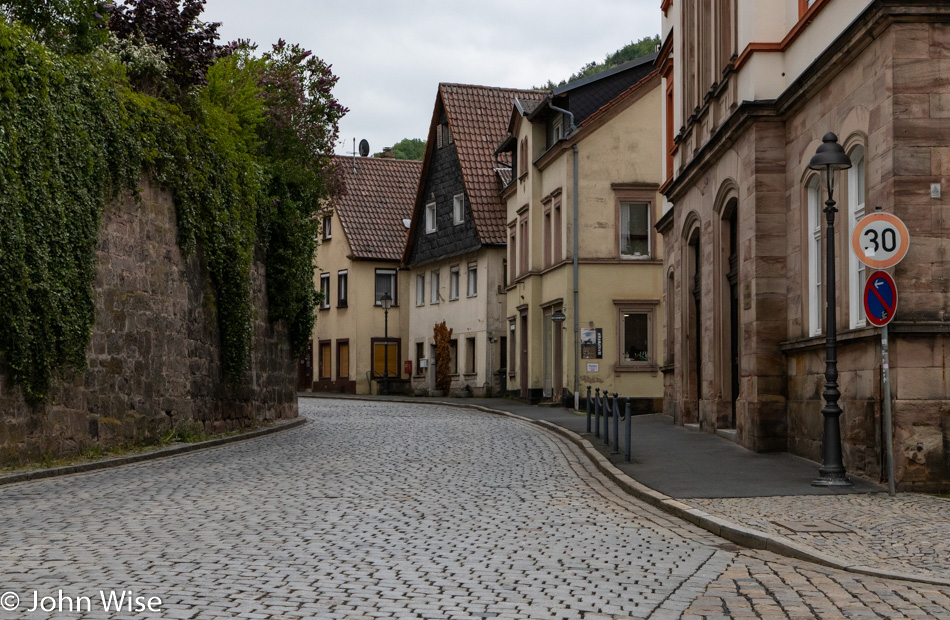
The bucolic image of Heidi singing in the mountains, of the farmer bringing produce to town, or the cobbler chipping away at a pair of shoes are still giving way to the barista, tour guide, and web developer making a new multi-language site for the visitor from around the world looking to attend a wine festival in Weimar, the Bayreuth Festival celebrating Richard Wagner, or Octoberfest in Munich. How does a 50-year-old laborer support a family of three trying to create an online personality that generates enough money to help contribute to his community?
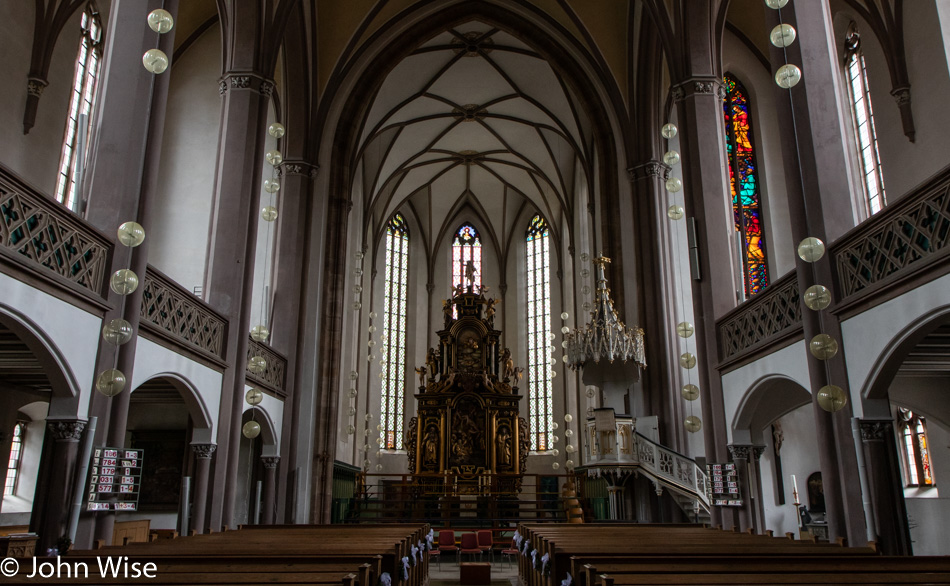
See a church, check the door. If it’s open, I’m going in, as one never knows when a wedding, a funeral, a baptism, or someone practicing on the organ might be happening within its walls. I don’t know the name of this church nor when it was built, but that doesn’t matter because after visiting 100’s of churches across Europe, I’m more interested in simply being present in the peaceful setting that has served the historic, cultural, and spiritual needs of communities over the centuries.

If first impressions can be wrong, they might very well have been barking up the wrong tree. As I approached the center of the old town, a beautiful view of a quaint historic village replaced the one of a decaying population wracked by increasing worry about the future. I readily admit that my myopic view of even this perspective is built on assumptions that those who operate businesses here do well based on weekend traffic and summer holidays, where people are visiting rustic villages and desiring to visit castles on the hilltop. I’m moving in that direction of going to the castle myself, though I’m not sure I’m on the right path as I’m traveling by sense of feel, be those intuitions right or wrong.
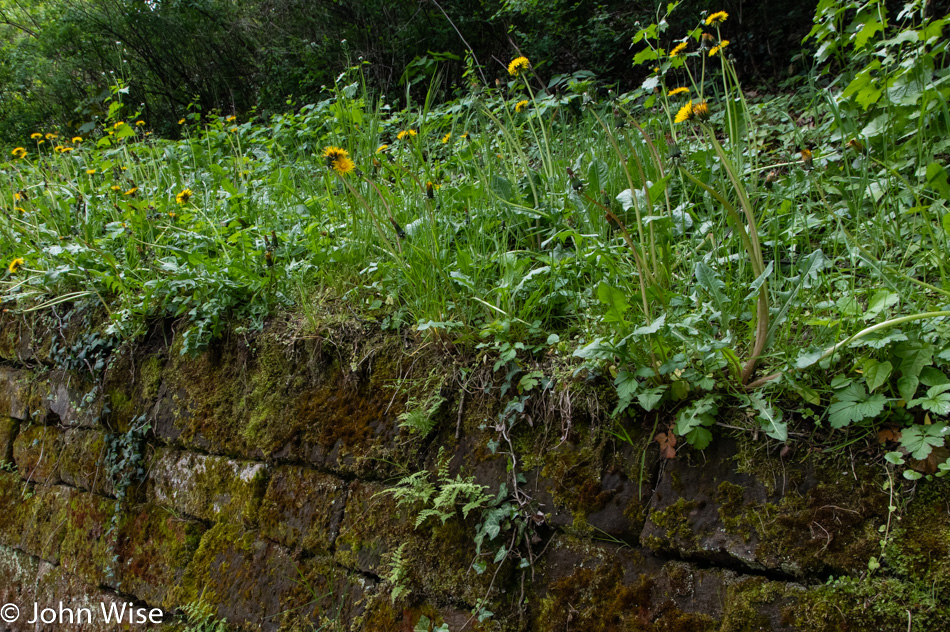
No matter where I end up, the way to where I’m going is worth the effort to go to that place.
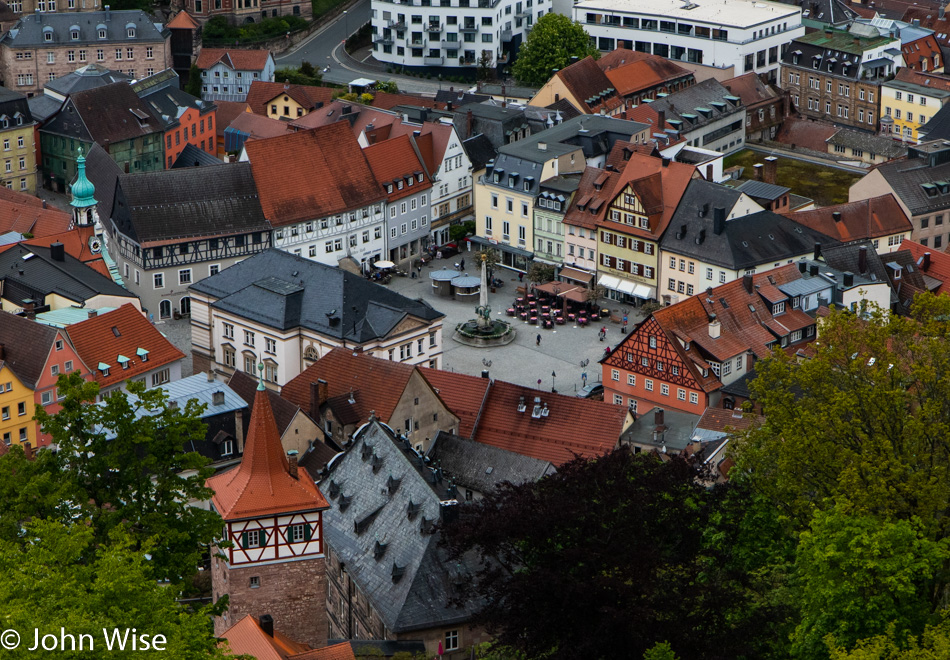
Up the mountain, I dragged myself climbing the equivalent of over 35 flights of stairs on a 22% incline. Plassenburg was my destination, and as long as I was going uphill, I figured I was on the right path. Originally mentioned back in 1135, but by 1554, it was destroyed and a new castle built. I can’t tell you if there’s an official entrance as I walked in a door up a tower and found myself in the museum. The exhibits here, while not in English, are fairly easy to figure out except for the details that will be lost in a lack of translation.
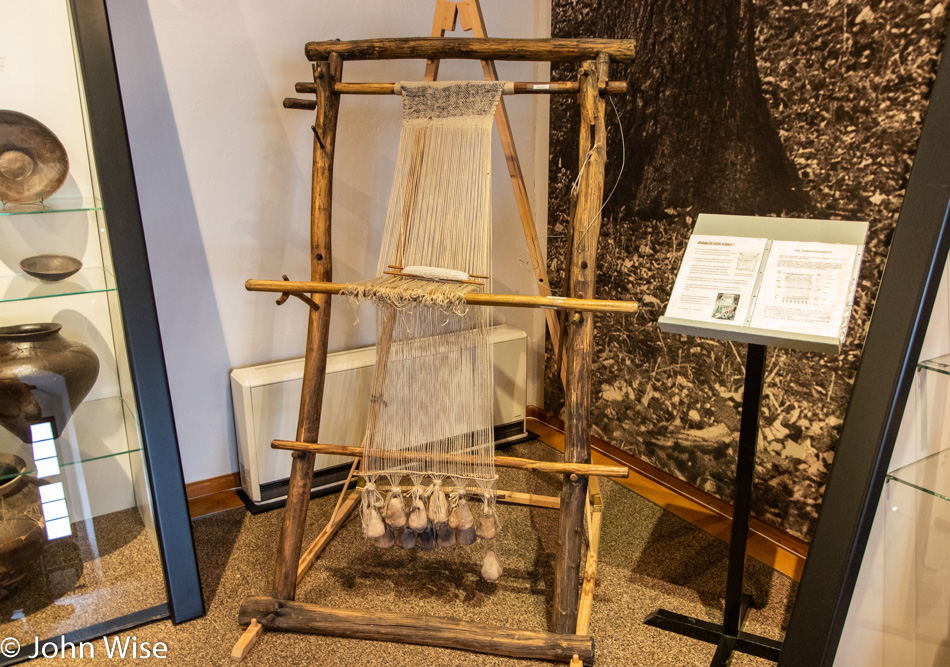

I thought I was going to breeze over the geological stuff, and then I spotted a loom and thought there might be a nice focus on medieval clothes I could capture for Caroline, but it turns out that the largest concentration of efforts here is on presenting death and mayhem.
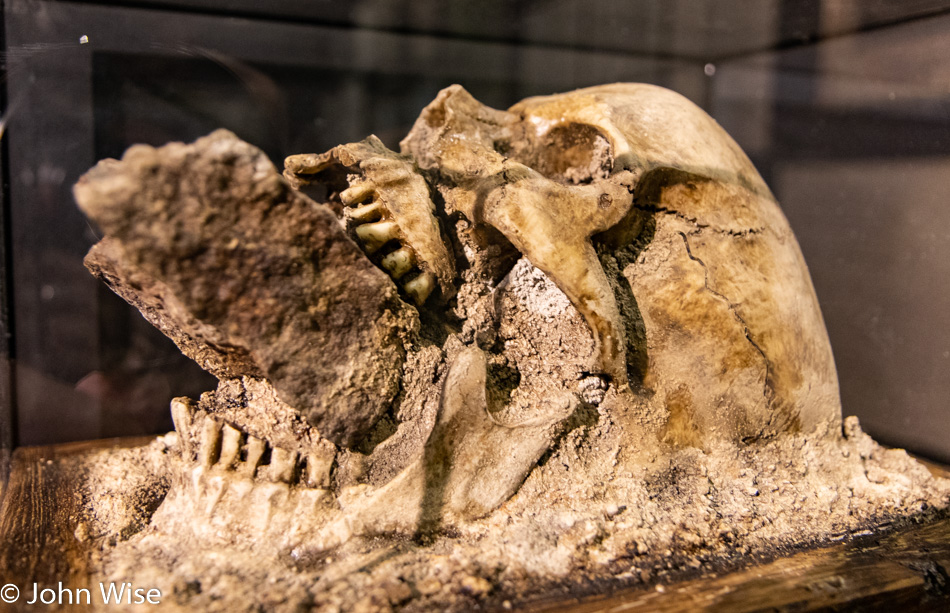
This castle, town, rising and falling economy, shifting work, and changing culture have me thinking about the younger generation again. The way I see it they are looking for meaning in the present while they embrace the past. When I was growing up, we were trying to throw off the past to live in the future. These kids and young adults inherited the future with smartphones, electric cars, the internet, private rocket ships, medicine that’s a quantum leap beyond what was had in 1970, prolific amounts of electricity from the sun and wind, cars that can drive themselves and robots that can make burgers.
*** Photo Note: When one was out digging up graves back in the day, you never knew when you might encounter a vampire. Should that unpleasant surprise be your treasure while robbing from the dead, there was the old trick of shoving a rock into the mouth of the bloodthirsty abomination to ensure they didn’t emerge from the earth below to feast on the living on some dark, foggy night when the werewolves were in short supply but monsters were not.


While the young borrow from history and pluck things out of fashion and music from generations past, they only consume it without giving it meaning. They are not interested in what is to be learned as they have so much current information that is being created contemporaneously. The prolific amounts of information mean they have difficulty keeping abreast of what their generation is trying to say if it’s trying to say anything at all. Through the noise, they are supposed to find meaning and purpose, neither of which can be supported by previous generations who themselves are having difficulty in staying current.
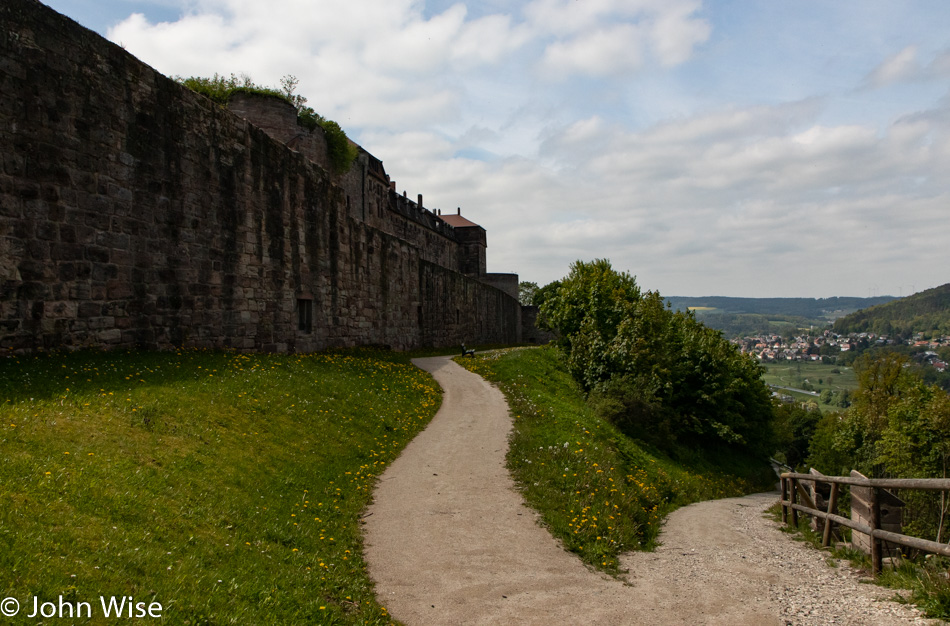
This then harkens back to a simpler time that is tied to my experience upstairs in the castle. A couple of the rooms dealt with vampires and wolfmen, witches, and others who had to be fully destroyed so as not to be a menace to the community. Masks and mythologies during ancient times came into existence and played an important role in structuring the local populace. The powers in control during that age were using these images and stories of horrors awaiting people in nature as a kind of theater of cruelty. Frightening people to believe in gods and monsters served two purposes: fear would motivate people to bring their souls to the body of God. Secondly, by using torture, burning at the stake, impalement, and beheading, all under the guise of a mesmerized public in the main square, the governing body and church could demonstrate to God-fearing people what awaited them for their transgressions.

Fashioning fursuits on gangly actors who might creep through town during the evening howling on the hunt to find victims for their bloodlust, wolfmen could terrorize a community. In this sense, people of the Middle and Dark Ages, right up until the time of films, were able to be corraled in fear by the authority brought by the powerful to instill upon the average person a deep fear and hope of redemption by a benevolent God and king.
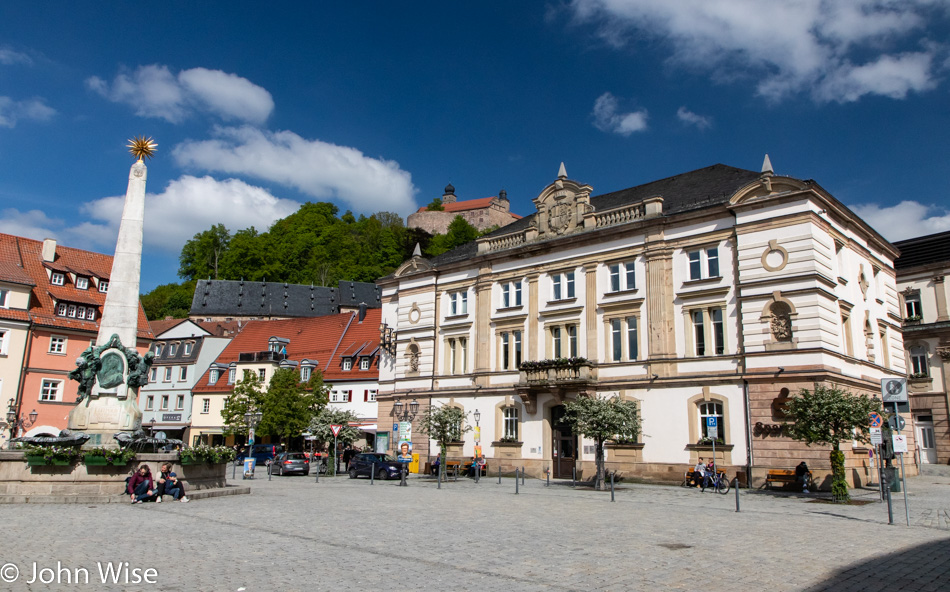
Back down in the now sunny town center, the people of Kulmbach have left their homes and flooded into the open air, where they’ve pulled up a table in the sun for some ice cream and coffee and, of course, the obligatory cigarette. I’ve taken a table myself for a coffee and mineral water and pulled out the trusty computer where, once again, I’m the anomaly in an otherwise heterogeneous setting.
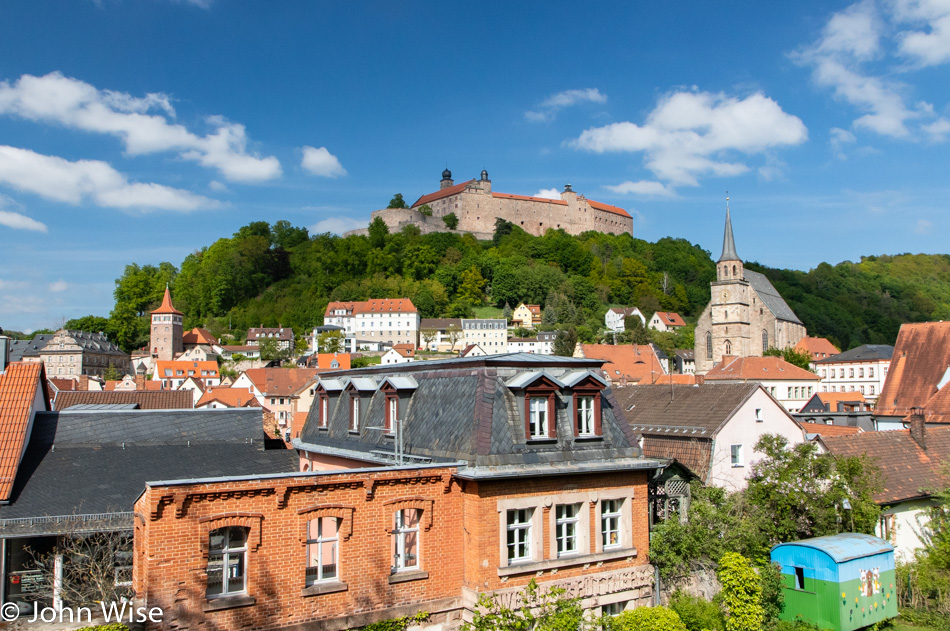
Regarding the Kulmbach Spinnerei, I walked by earlier in the day, I was talking with a young man at the Tourist Information office (yep, I went there to contradict the spontaneity I was claiming earlier) and he shared with me that if the city can talk the local brewery out of its location a university is going to be built on the site of both areas, thus negating my poor impression of town when I first arrived. They hope to start building in 2020. I found it interesting that this first impression when arriving by rail is a known issue that the community would like to address. I guess I’m more observant than I sometimes give credit to myself.
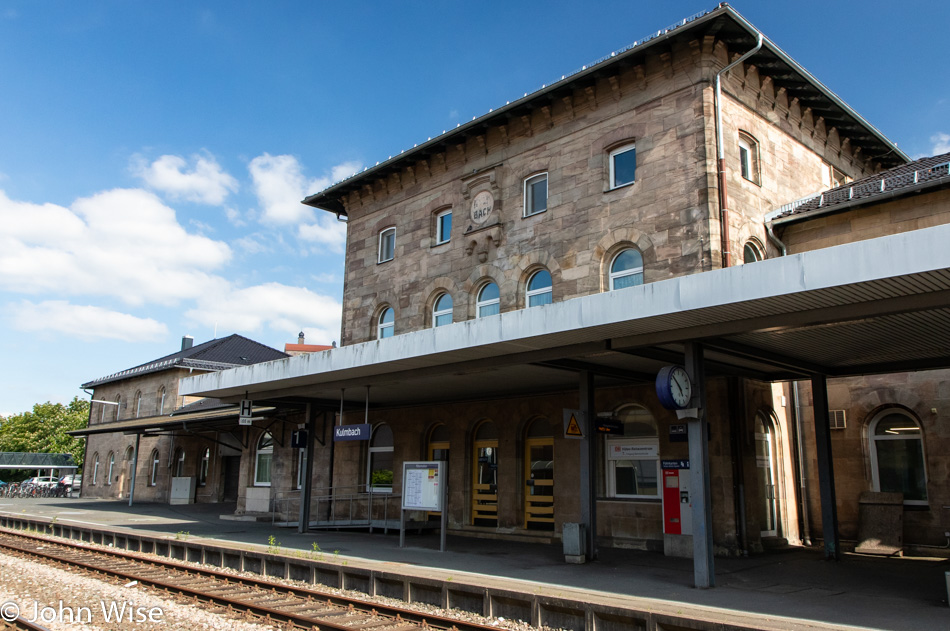
I’m on the shortest train I’ve ever ridden in Germany. With a quick count, there are about 100 seats on this single-car train that’s whipping along down the track. I left town on the road, well, the track, back to Bayreuth, though I’m not ready to be back there either. I’m considering heading into Pegnitz for dinner because I can, though that will leave me needing to go somewhere else tomorrow as that was the town I was considering should I feel I wanted to venture out of Bayreuth on Saturday. I’m considering heading into Nuremberg but that’s feeling like I’m defeating my purpose of sitting in place to effect some writing.
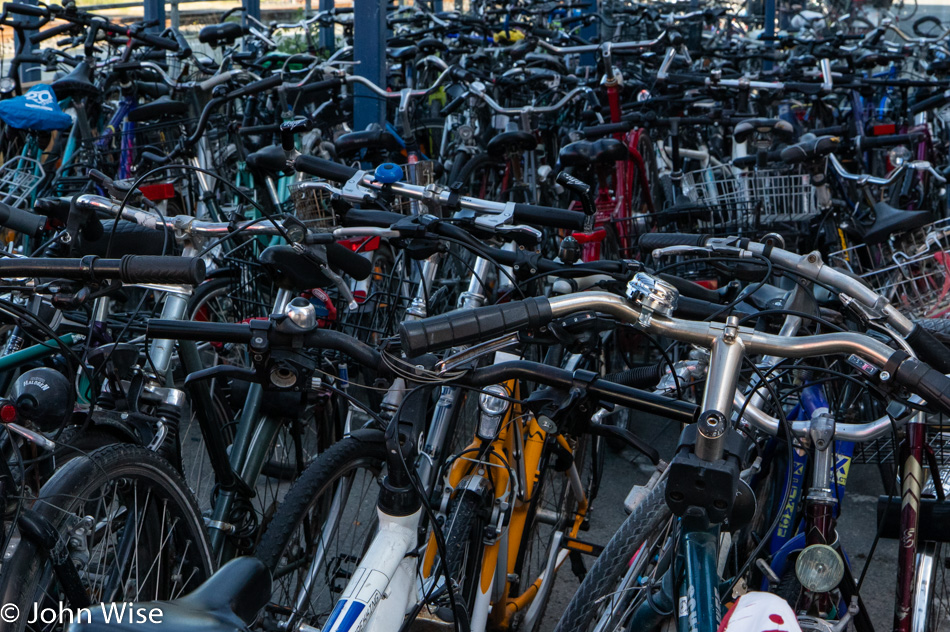
Indecision is the key to flexibility rings in my ears, thanks to Bruce Keller who I first imprinted those words into my mind on the Colorado River in the Grand Canyon a decade ago. Am I leaving Bayreuth for points south? Nope, I’m eating at L’Osteria as I’ve had enough pork and potato for the moment. I’m also spending some of my precious daylight under clear blue skies sitting outside on a surprisingly warm early evening.
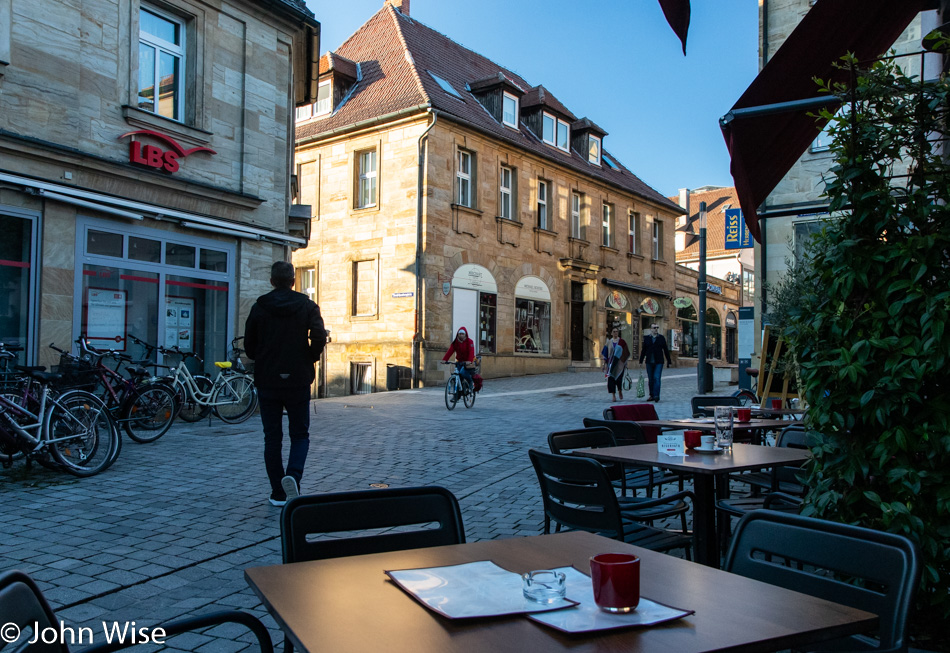
Sidewalk cafes are the place to be on pleasant days. Not only is it nice to be out of the overbearingly warm restaurants, but the added benefit of people-watching is also part of the admission. Speaking of watching stuff or people or whatever, there are no televisions in any of the restaurants I’ve visited. I’d like to emphasize that this not only pertains to the places I visit but also to the places I stop by to check out the menu. Can you imagine no TV? I can, and it’s perfect. Not a single fucking basketball, baseball, bowling, hunting, mass shooting, or other interminable bullshit being force-fed to diners getting fat on the stupidity of round-the-clock banality.
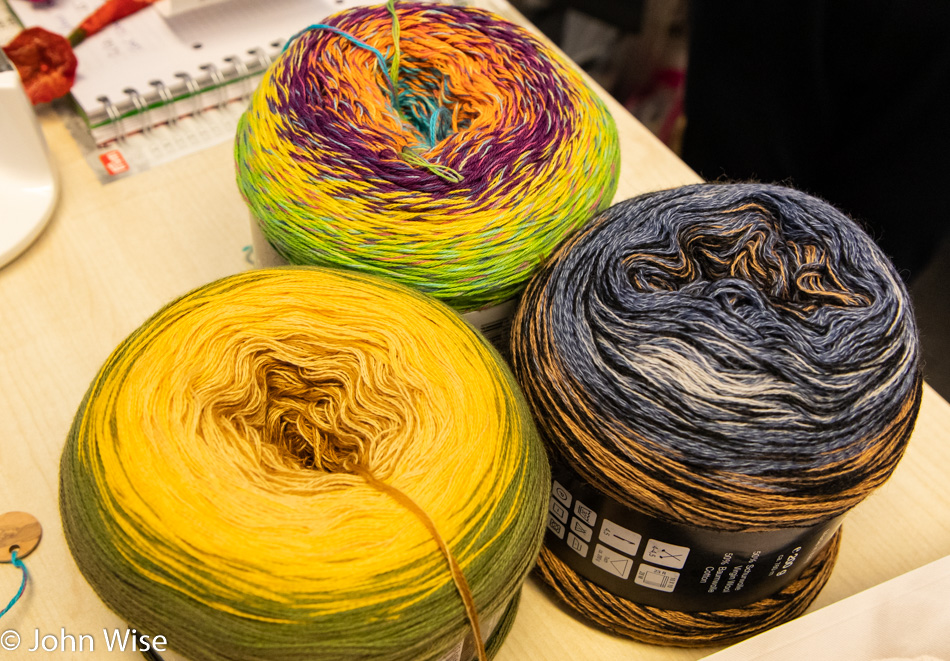
It’s Caroline’s lucky day as when I was leaving the main train station I spotted a yarn shop that features some German yarns from Lana Grossa. After a bit of consulting with her in Arizona and sending photos, I made up my mind about what to get her though she did have a minor amount of influence.
Dinner is done, I’m stuffed. I went into this with eyes bigger than my stomach, which really is one of the main stories of my life. But I’m satisfied, a little bit guilty, starting to chill, and running low on battery for both the computer and my phone, and maybe myself too. Trying to run fully on for the last two weeks only made sense considering the circumstances of being in Europe for an extended vacation; why would I pause to rest when every minute is precious here and running out? The same might be said about my sense of indulgence regarding eating foods that lend an authentic German flavor that cannot be found in America.
What an incredibly stupid idea to go back to the room. The poor excuse that I needed to drop the bag of yarns and maybe recharge my phone battery was not my best thinking. So now I’m transferring and trying to prepare some photos for today’s entry, and my eyes are falling heavy in ways that suggest I could easily fall asleep before 9:00 this evening. My determination says go get coffee and struggle through the fog of exhaustion. Maybe I’ll find a few words that will leave me inspired that I found such an amazing flow of yet more I wanted to share. I know I won’t because the brain is hardly firing on a cylinder or two.